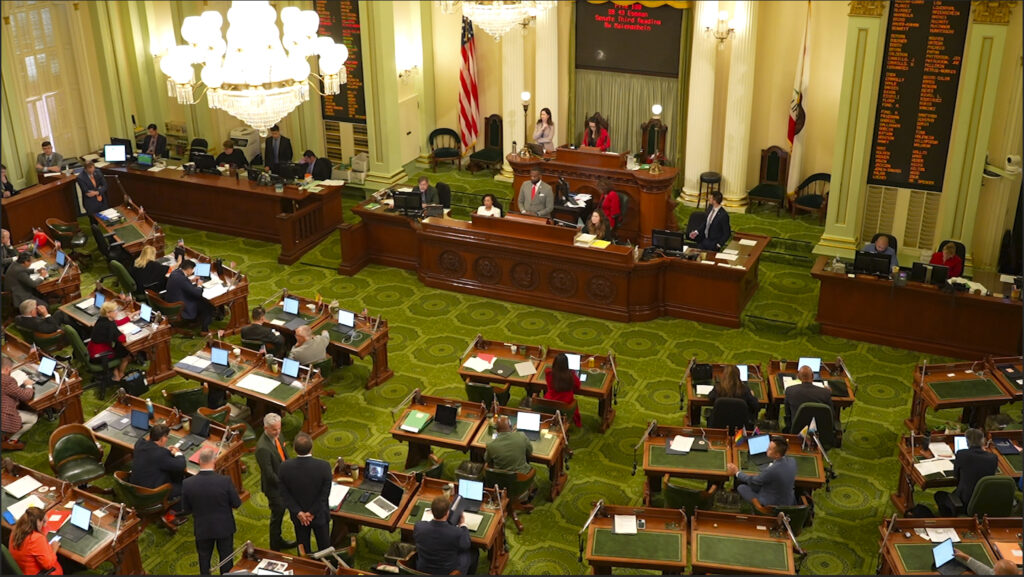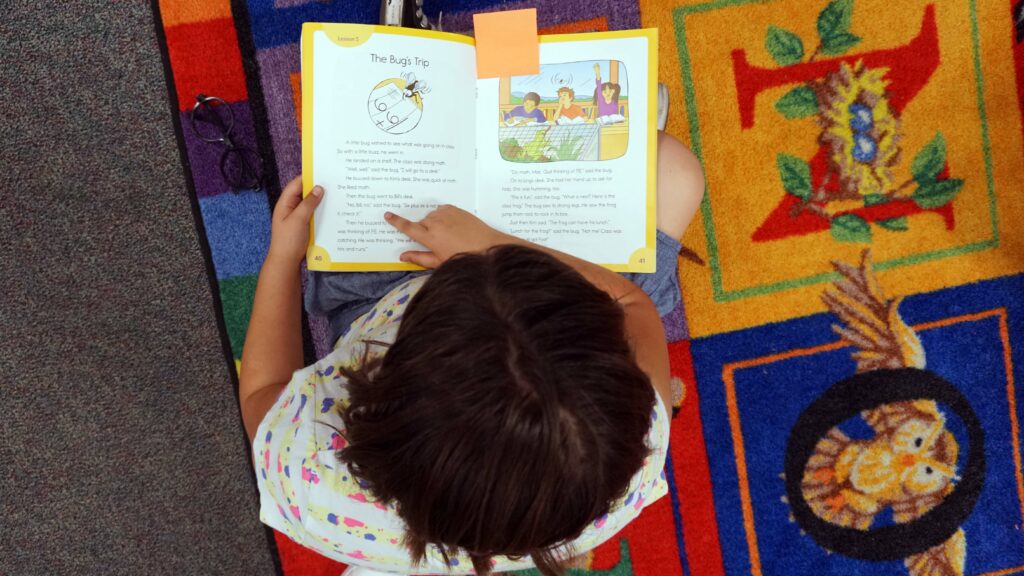
Senate Bill 1263 will be heard by the full Assembly if it makes it through the Assembly Appropriations Committee.
Credit: AP Photo/Terry Chea
A controversial bill that would have eliminated teaching performance assessments — the last licensure test California teacher candidates are required to take — has been dramatically revised under pressure from education advocacy groups.
Senate Bill 1263, sponsored by the California Teachers Association (CTA), would have ended the requirement that teacher candidates take video clips of classroom instruction, submit lesson plans, student work and written reflections on their practice to prove they are prepared to become teachers.
In mid-June, the bill was amended to retain the teaching performance assessments, with a provision that the California Commission on Teacher Credentialing convene a working group of teachers, college education faculty and performance assessment experts to review the assessments and recommend changes.
The revised bill, if passed, would require the commission to approve recommendations from the work group by July 1, 2025, and to implement them within three years from that date. The commission also would be required to make annual reports to the Legislature.
Leslie Littman, CTA vice president, said that the amendments retaining the test were “disappointing” but that the creation of the work group is a positive step toward addressing the concerns that union members have had with the assessment.
“I think that the way it was going to go, possibly the bill might not have made it out of the Legislature,” Littman said.
Many teachers say the test is a waste of time
Senate Bill 1263 was originally introduced by Sen. Josh Newman, D-Fullerton, chair of the Senate Education Committee, who said in April that eliminating the assessment would encourage more people to enter the teaching profession. He also said that it duplicates other requirements teachers must fulfill to earn a credential.
K-12 teachers who commented on EdSource stories about the legislation were overwhelmingly critical of the assessment, stating that it is too time-consuming, caused anxiety and does not help prepare teachers for the classroom.
California teacher candidates must pass either the California Teaching Performance Assessment (CalTPA), the Educative Teaching Performance Assessment (edTPA) or the Fresno Assessment of Student Teachers (FAST) before they can earn a preliminary teaching credential. The tests cost $300 total, or $150 per cycle, according to Littman.
Education advocates call the test a valuable tool
Proponents of the teacher performance assessments, however, say that eliminating them would have removed a valuable tool for evaluating teacher preparation programs and new teachers.
“We know when parents drop kids off at school, the most important thing in front of those kids is that teacher, and they want to make sure … that teacher is prepared to teach effectively, and that’s what the TPAs help do,” said Marshall Tuck, CEO of EdVoice, an education advocacy organization.
Criticism of the bill to eliminate the assessment grew when its authors amended it in late spring to remove the requirement that candidates for a preliminary, multiple-subject or education specialist credential pass a test that evaluates their ability to teach reading.
The move came less than three years after legislators passed Senate Bill 488, which next July will replace the unpopular written Reading Instruction Competence Assessment (RICA) with a literacy teaching performance assessment. The Commission on Teacher Credentialing spent more than a year developing the assessment with the help of a working group of literacy experts.
Resistance against legislation built
“Unsurprisingly, we got a little pushback from the Commission on Teaching Credentialing and some other folks who are stakeholders in this, including EdTrust-West and, not unimportantly, PTA groups,” Newman told EdSource on Wednesday.
After the legislation moved to the Assembly in late May, Education Committee Chair Al Muratsuchi, D-Torrance, began meeting with stakeholders, including the California Teachers Association, to discuss possible changes to the legislation. Representatives from the Commission on Teacher Credentialing also made their case for retaining the assessment to legislators.
Education advocates showed up at a public hearing and also reached out to legislators and their staff, Tuck said. In early June, 13 education advocacy organizations, including EdVoice, signed a letter in opposition to the legislation.
By June 17, the legislation had changed considerably.
Legislation charges commission with more oversight
Along with retaining the teaching performance assessments, the proposed legislation would require the commission to report the number of teaching preparation programs with low passing rates on the assessment. The commission would be charged with helping these programs learn how to better prepare teacher candidates.
The commission also would be required to maintain a secondary passing standard for the assessment that takes into consideration other evidence of a teacher candidate’s performance.
“ETW is hopeful that SB 1263 will now help to streamline and improve the administration and scoring of TPAs to ensure they are an additive, constructive experience for candidates, and that they do not have a disparate impact for candidates of color,” said Brian Rivas, senior director of policy and government relations for EdTrust-West (ETW), an education advocacy organization, in a letter to Assembly Appropriations Committee Chair Buffy Wicks, D-Oakland. “Doing so is critical for both addressing the state’s shortage of teachers of color and providing all students with teachers who are fully prepared to teach. For these reasons, we are pleased to support SB 1263.”
The legislation has an annual price tag of $598,000, with $145,000 in start-up costs, according to a state analysis. It is currently being considered by the Assembly Appropriations Committee.
Revised bill a good compromise
Tuck says the revised bill is an example of policy creation working correctly.
“I think that strong pushback from advocacy organizations, as well as from the CTC (Commission on Teacher Credentialing), really helped to shift the direction of the bill,” he said.
Rivas said Newman likely “read the tea leaves” and realized he might have a fight on his hands if he got the bill to the governor’s desk.
Newman sees the compromise as a good outcome.
“Legislation, sort of by definition, is a negotiation,” Newman said. “It was a commitment by the CTC to take a good, hard look and to reassess … the teacher performance assessment, so that it is not only less onerous but that it takes into account the existing demands on teaching candidates and also made sure that the assessment was fully relevant to the kind of skills and requirements that we are seeking from them.”
The amendments are enough for the Commission on Teacher Credentialing, EdTrust-West and other advocacy groups, to change course and support it.
“The commission welcomes the opportunity to engage with educators, teacher education faculty and the larger communities of interest to review and strengthen this important part of California’s teacher preparation system,” said Marquita Grenot-Scheyer, chair, and Mary Vixie Sandy, executive director of the Commission on Teacher Credentialing, in a joint letter to Muratsuchi in late June. “As amended, SB 1263 (Newman) aligns with the commission’s commitment to the process of continuous improvement, and the commission enthusiastically supports its passage.”
But this doesn’t mean the issue won’t return.
“It doesn’t preclude us from watching and seeing what happens in this work group,” CTA’s Littman said. “Then it doesn’t stop us down the road from bringing legislation back.”




